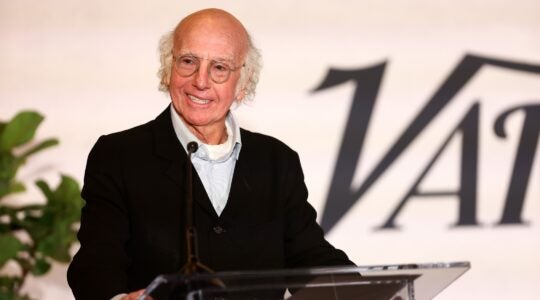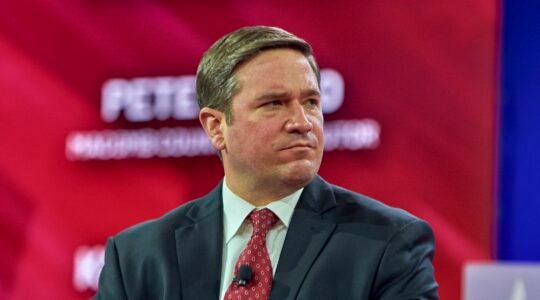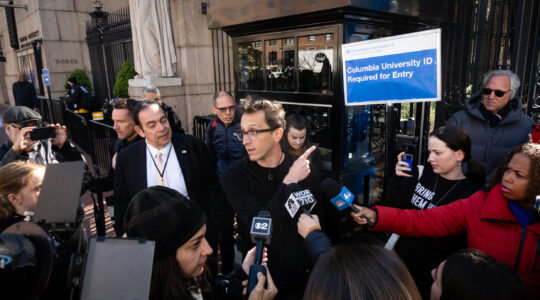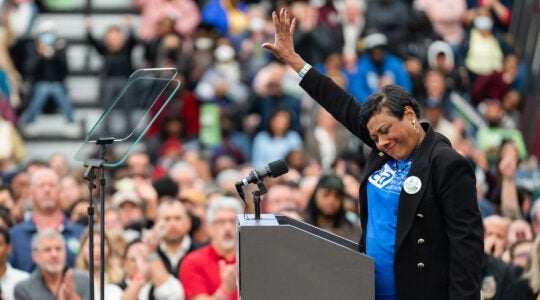NEW YORK (JTA) – The umbrella body of the North American federation system is one step closer to a major reorganization with the passage this week of a $40.2 million budget.The 2007-08 budget, passed Monday at the United Jewish Communities’ governance meetings in New York, is up from $38.8 million last year. To pay for the budget increase, the UJC is asking for a 3.7 percent
increase in dues from each of its 155 member federations.The budget
includes $2 million to be spent on program changes and a $2.6 million
savings from cutting 24 jobs.Unlike budgets in past years, which just allocated money to needs, this
one is designed to align the UJC system behind the restructuring plan,
as line items in the budget will force the UJC to follow the plan. Included in the budget is a $1.5 million line item for a “Fund for New Strategies” that will pay for the UJC’s new initiatives.
It is a hallmark of the UJC’s new president, Joseph Kanfer, who became
known as a master strategic planner as the CEO of GOJO, which makes
Purell hand sanitizer.”Part of our new plan is to be very focused in terms of what our goals and objectives are,” Howard Rieger, UJC’s president and CEO, told JTA.Rieger said the plan, unveiled informally in March, is based on helping the federation system to build partnerships, even outside the traditional federation world. “We need to work with others, and everyone might not want to be a part of that,” he said. “If they do no want to be, then we will find those who do and we will move forward.”According to the plan, the UJC will dissolve its current structure of four pillars and divide into two operating groups. One will be based in Israel and focus on Israel and overseas fund raising and operations. The other will be based in the United States and concentrate on helping the federations increase their donor base and campaigns.After dissolving its Renaissance and Renewal Pillar, UJC will create a Jewish Peoplehood and Identity Group.With the reorganization, UJC realized its current system needed improvement.The federation donor base has fallen from 630,486 in 1999 to 564,343 in 2005. And from 2001 to 2005, the last years for which numbers are available, the combined campaigns of North America’s federations, adjusted for inflation, were down by 11.1 percent, according to official figures.Rebuilding its donor base is among the UJC’s six stated goals for the reorganization. The others are to build up domestic communities by helping federation campaigns raise more money; build a financial resource development model based on the best practices that individual federations can adapt; enhance Jewish peoplehood by engaging the next generation; achieve meaningful stakeholder relationships by forming better partnerships between the UJC and the federations; and generate what it calls “big ideas,” or innovative new fund-raising strategies. For most federations, the plan seems like a long-needed step in the right direction for an organization that has been criticized for not providing the federations much return on their membership dollars since its inception in 1999.”Many people have been waiting and hoping and hoping that UJC would provide national leadership to the federated communities of North America,” said Norman Lipoff, a past president of the Jewish Federation of Greater Miami. He spoke at the UJC meetings on behalf of the Miami federation.Lipoff told JTA that the plan appears to be a move in that direction “by identifying the major problems of the day, having a plan to deal with them and having measurable goals that can be reviewed and evaluated.”But the plan has raised some concerns, particularly from federations concerned about the 3.7 percent dues increase and from UJC’s primary overseas partners, the Jewish Agency for Israel and the American Jewish Joint Distribution Committee. The Jewish Agency and the JDC have had to reduce their budgets in recent years because their allocations from UJC have either been cut or only increased moderately – not enough to keep up with inflation. Carole Solomon, chair of the executive of the Jewish Agency, said she applauds UJC for its new strategy, but she has serious concerns that smaller federations might have to dip into their Israel and overseas allocations to pay for their increase in dues. “Even under present circumstances there are some communities who over the past several years have paid their dues by going into what would have been their overseas allocations,” she told JTA. “It’s not an uncommon practice.”Solomon voiced these opinions at the UJC meetings, where several smaller federations reportedly expressed concern that they had already set their budgets for 2007-08 without allowing for a dues increase. Dissent on the dues issue at the meeting came from the Jewish Federation of Metropolitan Detroit, and the Jewish Federation of Palm Beach County and the Jewish Federation of South Palm Beach County in Florida. The Detroit federation was concerned that after the dues increase it would be paying the fourth highest fair-share dues, even though a Jewish population flight from Detroit has left the city with only the 22nd largest Jewish population in the country, according to UJC officials at the meeting. The two Palm Beach federations were concerned about a dues increase because their campaigns had leveled off, the officials said. Representatives of those federations were either unavailable for comment or declined to comment. Rieger told JTA that the federations were obligated to pay the dues increase. If they did not, he said, “we have a whole set of procedures to deal with it.”Now that the votes have passed, the UJC can start implementing its plan, which it intends to do by July 1, Rieger told JTA. When the details of the restructuring plan first started to trickle down to the federation system in March, after a document outlining the plan leaked to the press, it was met with harsh criticism at worst and skepticism at best. But in general the federations seem to have taken to it, as Rieger and Kanfer have better explained its details. The budget itself included an in-depth explanation of the restructuring plan. “In broad terms there is growing confidence that the leadership of UJC is moving in a positive direction and that under the leadership of Joe Kanfer, Kathy Manning and Howard Rieger, there is increased focus on how UJC can more effectively support federations both in their efforts to raise resources and in responding to the primary issues that face world Jewry,” said John Ruskay, executive vice president and CEO of the UJA-Federation of New York. Manning chairs the UJC’s executive committee.Ruskay said that Kanfer and Rieger met with the UJA-New York executive committee in early May to explain their restructuring plan and that they “were very effective and persuasive in explaining where UJC is and where it needs to go, and our leadership responded with enthusiasm.”Though there had been concern about potential overlap, as some large federations already have offices in Israel that interact with donors and plan missions, Ruskay said the New York federation is not concerned. Even Rieger’s immediate predecessor is excited about the new plan after some initial reservations.”When things are first introduced and change is proposed, people have to think about it,” the president and CEO of the Jewish Community Federation of Cleveland, Steve Hoffman, told JTA.”It had to sit with people and it needed explanation,” he said. “And the UJC leadership provided it.”
JTA has documented Jewish history in real-time for over a century. Keep our journalism strong by joining us in supporting independent, award-winning reporting.





